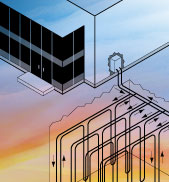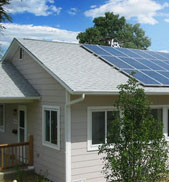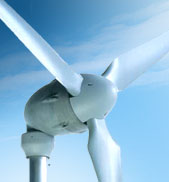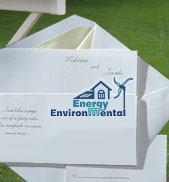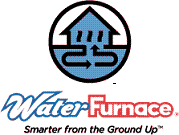System Pricing
The Economic Stimulus Act of February 2009 has extended and expanded residential renewable energy tax incentives. These incentives make the cost and installation of renewable energy systems extremely cost effective and competitive compared to the cost of conventional systems in a home. Highlights of the stimulus act include:
- Removal of all caps on the tax credits for residential renewable energy systems
- Federal tax incentive is now 30% of the cost of qualified solar hot water, solar photovoltaic, geothermal heat pumps, and small wind turbine systems.
Cost and Savings of Residential Renewable Energy Systems
Below is a table which outlines the costs, including the expanded federal incentives, monthly savings, example financing, and the resulting monthly change in cash flow. We always recommend an energy audit, followed by recommendations for air sealing and insulation for a home in order to reduce the heating/cooling loads of the home prior to designing and installing renewable energy systems.
The cost savings resulting from increased energy efficiency can be immediately realized when included as part of a monthly mortgage payment. For example, insulating and air sealing would cost an estimated $3,850, after federal tax incentives. Financing this integrated system at 6% would result in a payment of $23 a month, but these improvements would save an estimated $45 per month. As a result, the homeowner comes out ahead. These estimates do not include state incentives which might be available in your area. Visit DSIRE for information on incentives in your local area.
See below for information on refinancing your home mortgage to include renewable energy systems. Also, see Boulder's Climate Smart Loan Program which provides a voluntary mechanism for commercial and residential property owners to obtain financing for renewable energy and/or energy efficiency improvements to properties in Boulder County.
Prices listed are estimates only and will vary for each individual home. We now offer six months same as cash financing for qualified buyers, which can be used to pay for a portion of systems while waiting on refund from federal tax rebates. Please Contact Us for a quote.
Average Installed System Cost for 2500 SF Home
|
Monthly Average Utility Bill = $325 |
|
Installed Parts and Labor |
Net Cost |
Estimated Monthly |
Simple |
Simple |
Payment |
Change |
|
Spray Air Sealing/Insulating/Energy Inspection |
$5,500 |
$3,850 |
$45 |
14.0% |
7.1 |
$23 |
$22 |
|
|
Geothermal/Horiz Loop 5 ton & Solar Heating |
$47,500 |
$33,250 |
$200 |
7.2% |
13.9 |
$199 |
$1 |
|
|
Solar Domestic Hot Water for Radiant Heating |
$22,500 |
$18,750 |
$110 |
7.0% |
14.2 |
$112 |
($2) |
|
|
Geothermal/H Loop - 5 ton Heat/Cool Radiant |
$29,500 |
$20,650 |
$120 |
7.0% |
14.3 |
$124 |
($4) |
|
|
Geothermal/Vertical Loop – 6 ton Heat/Cool Air |
$34,000 |
$23,800 |
$130 |
6.6% |
15.3 |
$143 |
($13) |
|
|
Solar Domestic Hot Water No Space Heating |
$9,000 |
$6,300 |
$32 |
6.1% |
16.4 |
$38 |
($6) |
|
|
Energy Recovery Ventilator/HEPA Air Filtration |
$3,400 |
$2,380 |
$12 |
6.1% |
16.5 |
$14 |
($2) |
|
|
10kW Wind Turbine 120 Ft Guyed Tower |
$57,000 |
$39,900 |
$200 |
6.0% |
16.6 |
$239 |
($39) |
|
|
1.7kW Wind Turbine 35 Feet Tower |
$13,000 |
$9,100 |
$35 |
4.6% |
21.7 |
$55 |
($20) |
|
|
Tankless Hot Water Heater - Electric Partial Load |
$2,500 |
$1,750 |
$4 |
2.7% |
36.5 |
$10 |
($6) |
|
|
Solar Photovoltaic Electric Array 6 KW |
$48,000 |
$33,600 |
$72 |
2.6% |
38.9 |
$201 |
($129) |
|
|
Tankless Hot Water Heater - House Natural Gas |
$4,850 |
$3,395 |
$5 |
1.8% |
56.6 |
$20 |
($15) |
|
Energy Efficiency Financing
With strong incentives, including the 30% federal tax credit, there's never been a better time to make the investment in renewable energy. A record number of people are refinancing their homes to take advantage of historically low refinancing rates and fund the up front costs of installing renewable energy systems in their home.
Low interest rates present a tremendous opportunity to install renewable energy systems in your home. You can achieve a low monthly payment for the system/s by adding them to the cost to your new mortgage. You will reduce your monthly utility costs, and in most cases, your monthly mortgage payment will still be lower than its current value.
Energy efficiency financing is available for homeowners looking to buy, sell, refinance, or remodel their home. An energy mortgage is a mortgage that credits an efficient home’s energy savings in the home loan. It allows the home buyer to buy a higher quality home because of the lower monthly costs of heating and cooling the home. For energy efficient improvements, the money that will be saved in monthly utility bills is used to finance energy improvements. There are two types of energy mortgages:
Energy Efficient Mortgage (EEM) – The lending industry recognizes that saving energy reduces monthly utility bills which frees up more income to help pay a mortgage. EEM mortgages finance new home purchases through the monthly savings from the new energy efficient home. This allows borrowers to stretch the debt-to-income qualifying ratios on loans to qualify for a larger loan amounts and finance energy savings improvements as part of their new home loan.
Energy Improvement Mortgage – EIM mortgages finance the home energy improvement of an existing home through monthly energy savings gained by improvements. During purchasing, selling, or refinancing, the extra money borrowed for energy improvements are rolled into a new mortgage and spread over term of the mortgage
To qualify for an energy efficient mortgage, a borrower has to hire a home energy rater to perform a home energy rating before financing can be approved. The rating is a detailed evaluation of your home's energy use and verifies that the home is energy-efficient. It covers the quality of your building envelope (windows, doors, insulation, and air sealing), your heating, cooling, and ventilation system, and takes into account energy efficient lighting and appliances.
The Residential Energy Services Network's (RESNET®) established rating standards that are recognized by the U.S. mortgage industry for EEMs and by the federal government for verification of building energy performance for federal tax incentives, the ENERGY STAR program and Building America Program. A certified RESNET rater, or energy auditor, uses energy analysis software to prepare a report based on the details of your home. The home is given a rating between 0 and 100, 0 indicating the highest efficiency zero energy home. Recommendations for energy efficient improvements, their cost, effect on energy use, and monthly savings are included in the report.
In addition some states have passed legislation establishing low interest loans for energy efficiency improvements. In 2008, Colorado passed senate bill 184 "Colorado Clean Energy Finance Program," which creates the Colorado Clean Energy Finance Program within GEO to provide loans to home owners for “clean energy improvements: any repair of or addition or improvement to residential real property…that improves the energy efficiency of the property or replaces all or a portion of the energy from nonrenewable sources…with energy from renewable sources. More information on financing can be found at EGIA Geosmart Homeowner Center and through the links below.



